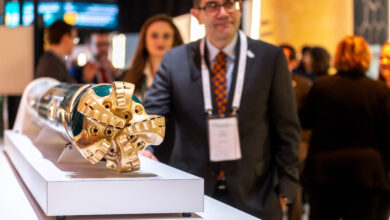Diamandis: World’s greatest challenges are opportunities for innovation through collaboration

By Katherine Scott, associate editor
“Innovation comes from absolute persistence, because everything is extraordinarily difficult. Everything is impossible until you make it happen,” Dr Peter Diamandis, chairman and CEO of the X-PRIZE Foundation, said at the Shell Innovation Summit on 9 January in Houston. The organization partners with companies like Shell to launch large-scale incentive competitions that attempt to positively impact humanity by pushing the limit of what is currently possible in categories such as education, energy and environment, exploration, global development, and life sciences. The first prize was awarded in 1996.
“One of the things that we have done at X-PRIZE through partnerships is really bring together the government world, the corporate world and the philanthropic world. It’s about getting a cross-pollination of ideas, about people looking at challenges from a right angle.”
For example, after the 2010 Macondo oil spill, the X-PRIZE Foundation noticed that the rate at which oil could be cleaned from the ocean surface had not changed since the Exxon Valdez spill 21 years earlier. “We ended up creating a partnership between Shell, the Department of the Interior and a philanthropist for how to increase oil spill cleanup,” Dr Diamandis said. A competition was launched in July 2010 asking the world, “How would you at least double the spill cleanup rate on the ocean surface so it would be cleaned up before it hit the shore?”
After 350 entries were narrowed down to 10 teams, the groups went head to head, and seven of the 10 eventually successfully doubled the cleanup rate. “The team that thought it was impossible actually figured out how to do a 600-fold increase. They were forced to throw out everything they had done before and look at a brand-new approach.”
Illustrating the fact that you never know where innovation will come from, Dr Diamandis said one of the teams that doubled the cleanup rate got their start in a Las Vegas tattoo parlor. “You truly can incentivize non-traditional players around the planet to take a shot at something difficult and have them come up with unexpected success.”
In today’s atmosphere, Dr Diamandis believes there isn’t a better time for collaboration between non-traditional disciplines. “We are at a rate of innovation growth that’s unfathomable,” he said, adding that approximately 2 billion people were connected to the internet in 2010, but that by 2020, up to 5 billion people would be online. “That mean 3 billion new minds; 3 billion new people coming online who are going to be exchanging and creating ideas.”
It’s no surprise, then, that technology solutions are accelerating, he said, enabling a world better than before. “Over the last hundred years, the human life span has more than doubled, the per capita income has more than tripled, the cost of food and cost of transportation have come down, and we’re living during the most peaceful time ever in human history, all as a result of technology,” Dr Diamandis said. Just as technologies that exist today weren’t around a decade ago, new products are conceptualized everyday, he added. “You’re going to be completely dependent on things that you can’t even conceive of today.”
By searching outside of typical disciplines for collaboration and partnerships, finding new solutions is simply a matter of identifying where current challenges exist, Dr Diamandis said. “The world’s biggest problems today are the world’s biggest market opportunities.”




